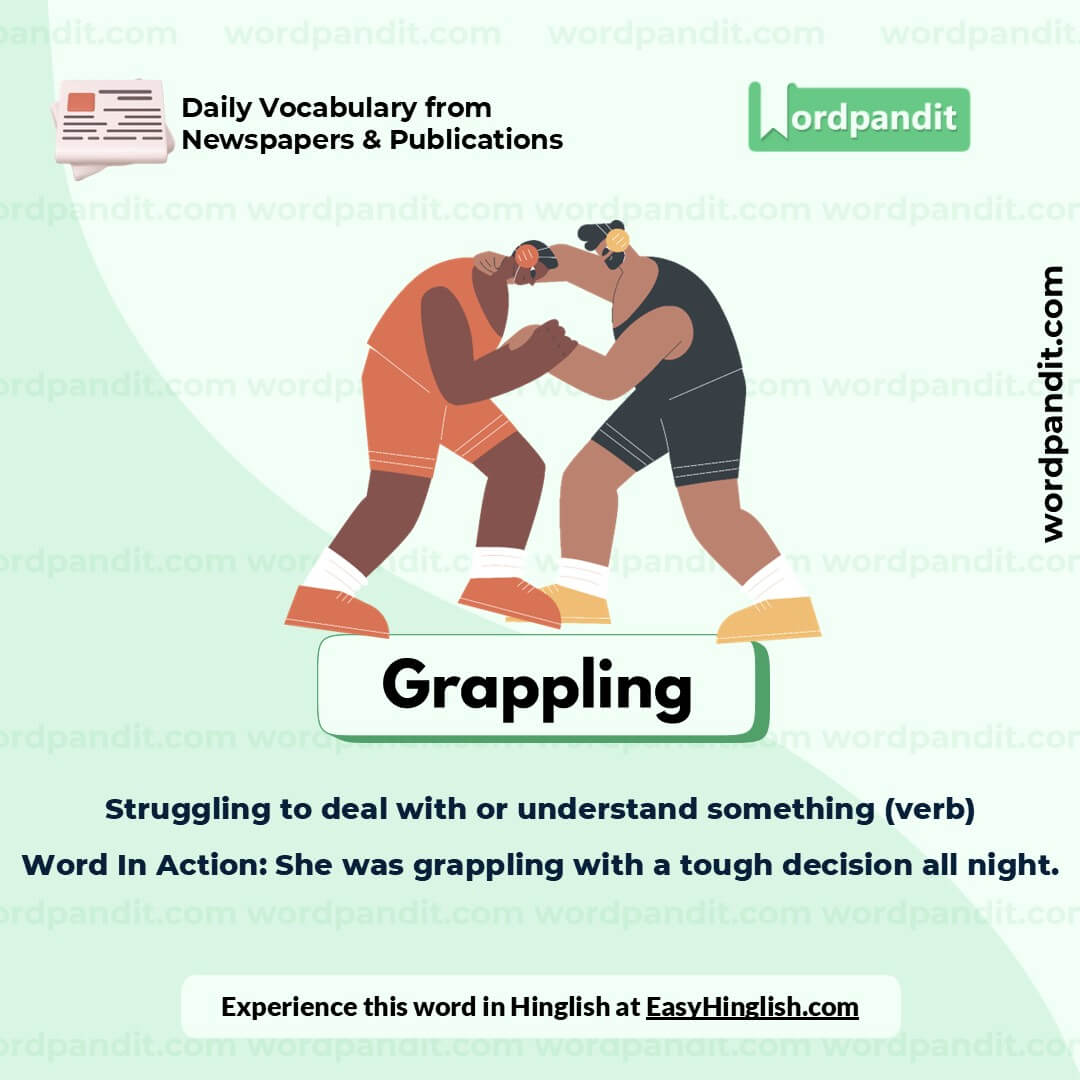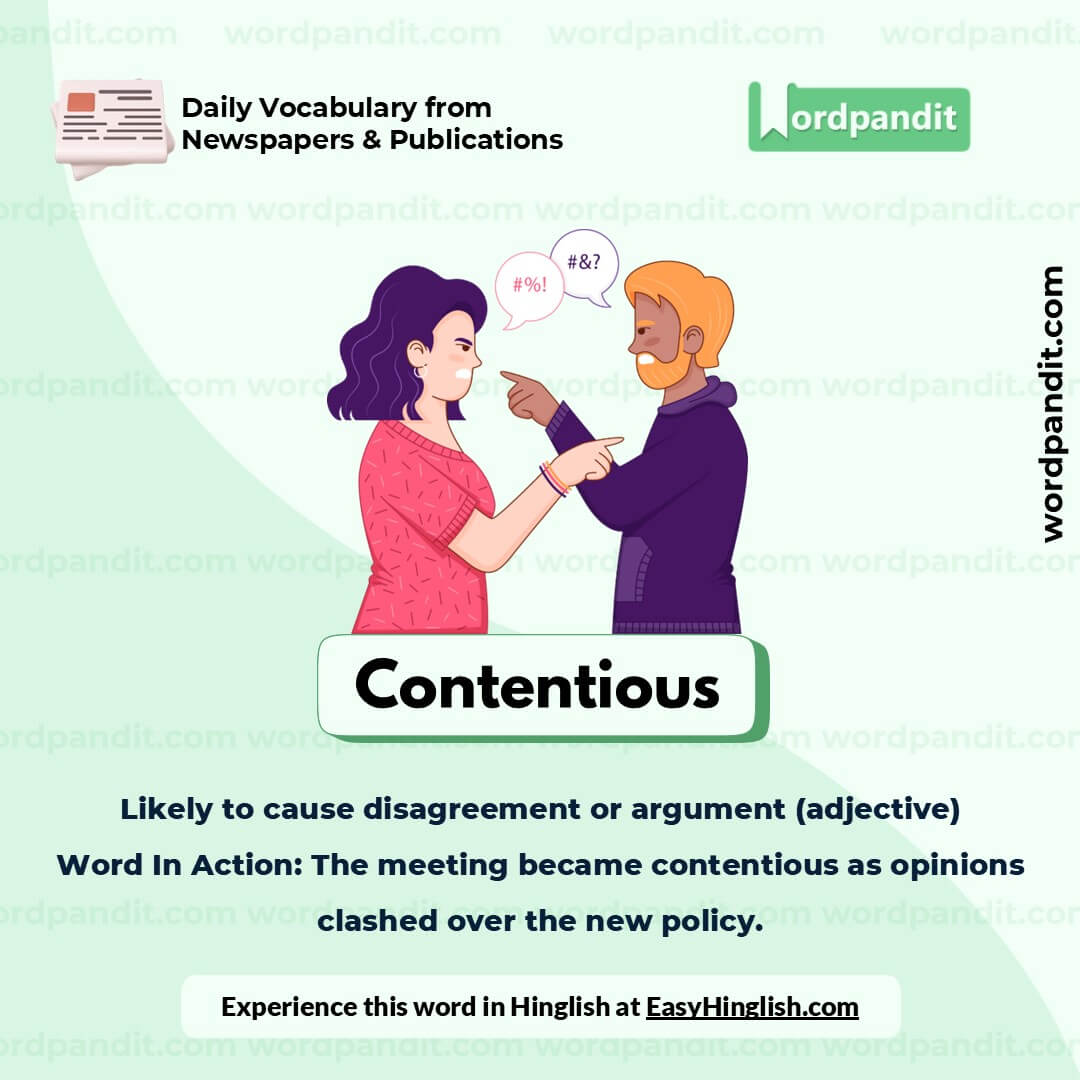Daily Vocabulary from Indian Newspapers and Publications
Welcome to Wordpandit’s Indian Vocabulary Hub
At Wordpandit, we understand the importance of staying rooted in the local context while expanding your language skills. This section focuses on enriching your vocabulary with words and phrases drawn from India’s leading newspapers and publications, ensuring you're learning vocabulary that is practical, relevant, and uniquely Indian.
Why Indian Sources Matter
We believe that the best way to master any language is by immersing yourself in local content. That’s why we carefully curate vocabulary from top Indian publications, including:
- The Hindu
- The Times of India
- The Economic Times
- Hindustan Times
- Live Mint
- The Indian Express
- And many others...
Stay Updated, Stay Relevant
With daily updates from Indian news sources, you’ll be consistently learning words that reflect the trends and shifts in Indian society and culture. Our focus is to provide vocabulary that enhances your understanding of the language in an Indian context.
How Wordpandit Supports Your Goals
Whether you’re preparing for exams, aiming to improve your professional communication, or simply want to stay connected with the latest Indian vocabulary, Wordpandit is here to guide you every step of the way.
Learn with a Practical Approach
Our interactive learning methodology includes real-world examples, engaging activities, and context-specific usage to ensure that every word becomes part of your active vocabulary.
Dive into Indian Vocabulary Today!
Why Choose Wordpandit?
Practical Learning: Focus on words you'll actually encounter in real-world reading, enhancing your comprehension and communication skills.
Diverse Content: From current affairs to scientific breakthroughs, our varied sources expose you to vocabulary across multiple domains.
Effortless Integration: Make Wordpandit a part of your daily routine. Just a few minutes each day can significantly boost your lexicon over time.
Your Path to Vocabulary Mastery
- Visit our Daily Vocabulary section regularly
- Explore new words and their usage in context
- Practice incorporating these words into your own writing and speech
- Track your progress as your vocabulary expands
Start Your Journey Today
Embark on your vocabulary enhancement journey with Wordpandit. By consistently engaging with our daily posts, you'll build a robust vocabulary that serves you well in academic, professional, and personal contexts.
Remember, a word a day keeps linguistic limitations at bay. Make Wordpandit your daily companion in the quest for vocabulary excellence!
WORD-1: Belligerence
Context:
"Dropping his previous belligerence on the abrogation of Article 370, Mr. Abdullah has sought to tread the path of reconciliation." - The Hindu
Explanatory Paragraph:
Belligerence refers to an aggressive or confrontational attitude, often indicating readiness for conflict or hostility. In a political or personal context, belligerence can imply stubbornness or an inclination toward argument rather than compromise.
Meaning: Aggressive or warlike behavior (noun)
Pronunciation: buh-LIJ-er-uhns
Difficulty Level: ⭐⭐⭐⭐ (Advanced)
Etymology: From Latin belligerare meaning "to wage war," derived from bellum (war) and gerere (to carry on)
Synonyms & Antonyms:
Synonyms: hostility, aggression, combativeness, antagonism, pugnacity
Antonyms: peace, harmony, friendliness, cooperation, amiability
Usage Examples:
- The debate was marked by unexpected belligerence from both sides.
- Her belligerence in negotiations often led to stalemates rather than solutions.
- The belligerence of the protesters alarmed city officials.
- Despite his usual calm demeanor, a hint of belligerence appeared in his tone.
Cultural Reference:
"Peace cannot be achieved through belligerence but only through understanding and dialogue." - Inspired by Martin Luther King Jr.
Think About It:
In what situations might belligerence be a disadvantage, even if you believe you're fighting for a good cause?
Quick Activity:
Identify a character in a book or movie who displays belligerence. Write a few sentences describing how it impacts their relationships.
Memory Tip:
Associate "belligerence" with "bell," imagining a warning bell signaling aggressive behavior.
Real-World Application:
Understanding "belligerence" can improve conflict resolution skills by recognizing when conversations shift toward aggression, allowing for intervention to maintain harmony.
WORD-2: Grappling
Context:
"Kerala is again grappling with the merits and demerits of nuclear power plants." - The Hindu
Explanatory Paragraph:
Grappling refers to a situation where one is deeply involved in a struggle or trying to deal with a challenging issue. It can describe both physical struggles, like wrestling, and mental ones, where someone is trying to understand or solve a difficult problem.
Meaning: Struggling to deal with or understand something (verb)
Pronunciation: GRAP-ling
Difficulty Level: ⭐⭐⭐ (Intermediate)
Etymology: Derived from the Old French grapil, meaning “hook,” referring to grappling as both holding onto something or dealing with it
Synonyms & Antonyms:
Synonyms: struggling, wrestling, contending, handling, dealing with
Antonyms: ignoring, neglecting, dismissing, avoiding
Usage Examples:
- The government is grappling with how to manage the effects of climate change.
- She found herself grappling with the complex issues of modern technology.
- Scientists are grappling with the mysteries of the deep sea.
- After the sudden change, he was grappling with his emotions.
Cultural Reference:
In literature, characters often grapple with inner conflicts, such as Hamlet in Shakespeare’s play, who struggles with avenging his father’s death.
Think About It:
What is a challenge you have grappled with, and how did you eventually resolve or make peace with it?
Quick Activity:
Think of a difficult problem you're currently facing. Write down three possible ways you could start grappling with it.
Memory Tip:
Imagine “grappling” like “grabbing hold” of a problem and working hard to find a solution.
Real-World Application:
The word "grappling" is often used in discussions about societal challenges, like grappling with new technology or environmental issues, highlighting the ongoing effort required to manage them.
WORD-3: Contentious
Context:
"The Electricity Minister... has sought to tread lightly on the contentious issue." - The Hindu
Explanatory Paragraph:
Contentious describes something that is likely to cause disagreements or arguments. It can refer to topics, issues, or actions that stir up controversy and provoke opposing viewpoints. People often approach contentious issues cautiously to avoid conflict.
Meaning: Likely to cause disagreement or argument (adjective)
Pronunciation: kuhn-TEN-shuhs
Difficulty Level: ⭐⭐⭐ (Intermediate)
Etymology: From Latin contentiosus, meaning "quarrelsome," derived from contendere meaning "to strive or argue"
Synonyms & Antonyms:
Synonyms: controversial, disputable, debatable, provocative, polemic
Antonyms: agreeable, uncontroversial, non-contentious, peaceful
Usage Examples:
- The proposal for the new highway has become a contentious topic in the community.
- His contentious remarks often lead to heated discussions in meetings.
- The court case involved a contentious debate over property rights.
- Contentious political issues can lead to prolonged public debates.
Cultural Reference:
The term "contentious" is often used to describe social issues like immigration or taxation, which can divide public opinion and lead to heated discussions.
Think About It:
Why do you think certain issues become contentious, and how can we approach them constructively to reduce conflict?
Quick Activity:
Identify a current event or topic you find contentious. Write a paragraph explaining why it provokes such strong opinions.
Memory Tip:
Think of "contentious" as "content" plus "tension," reminding you of the tension or conflict the word represents.
Real-World Application:
Understanding the term "contentious" can help you approach difficult discussions with empathy and awareness, especially when dealing with sensitive topics in the workplace or in social settings.
WORD-4: Consensus
Context:
"The government can scarcely embark upon such a project without consensus and public approval." - The Hindu
Explanatory Paragraph:
Consensus refers to a general agreement or shared understanding among a group of people. When there is consensus, all parties involved agree on a decision, idea, or action, often after discussing and considering everyone’s viewpoints. It's essential for collaborative decisions and progress.
Meaning: General agreement or shared opinion among a group (noun)
Pronunciation: kuhn-SEN-suhs
Difficulty Level: ⭐⭐⭐ (Intermediate)
Etymology: From Latin consensus, meaning "agreement, accord," derived from consentire, "to agree"
Synonyms & Antonyms:
Synonyms: agreement, harmony, accord, unity, concurrence
Antonyms: disagreement, conflict, discord, dissent
Usage Examples:
- After a lengthy discussion, the committee reached a consensus on the new policy.
- There is a consensus among scientists that climate change is a pressing issue.
- The company strives to make decisions by consensus whenever possible.
- A consensus was reached to postpone the event due to bad weather.
Cultural Reference:
In democratic systems, consensus-building is a crucial process, helping to ensure policies reflect a range of perspectives and promote unity.
Think About It:
How does reaching a consensus differ from simply following the majority opinion, and why might it be important?
Quick Activity:
Think of a group decision you've been part of. Did you reach a consensus? Write down what helped or hindered that process.
Memory Tip:
Remember "consensus" as "common sense" agreement, where everyone feels the decision is sensible for the group.
Real-World Application:
In workplaces and organizations, reaching consensus can strengthen team cohesion, as it ensures all voices are heard and valued in decision-making.
WORD-5: Embark
Context:
"The government can scarcely embark upon such a project without consensus and public approval." - The Hindu
Explanatory Paragraph:
Embark means to begin a journey or start an important project or venture. This word often conveys a sense of purpose and commitment, as embarking on something usually involves a significant effort or intention to achieve a goal.
Meaning: To begin or start a major activity, project, or journey (verb)
Pronunciation: em-BARK
Difficulty Level: ⭐⭐ (Intermediate)
Etymology: From Old French embarquer, meaning "to put on a ship," derived from en- (in) and barque (boat)
Synonyms & Antonyms:
Synonyms: commence, begin, initiate, launch, set out
Antonyms: cease, end, conclude, finish, halt
Usage Examples:
- She decided to embark on a new career in education after years in corporate work.
- The explorers embarked on a challenging journey through the mountains.
- We are ready to embark on the next phase of the project.
- The family embarked on a cross-country road trip for the summer.
Cultural Reference:
"To embark is to let go of the shore and trust the vast unknown ahead," an idea often found in adventure stories and explorative journeys.
Think About It:
Why is embarking on a new project or journey often both exciting and intimidating?
Quick Activity:
Write down a goal or project you want to embark on. What is the first step you would take to get started?
Memory Tip:
Think of "embark" like "boarding" a ship or journey, taking the first step towards something new.
Real-World Application:
In business and personal life, "embark" is commonly used to express the beginning of new ventures or journeys, emphasizing commitment and the start of an adventure.


















